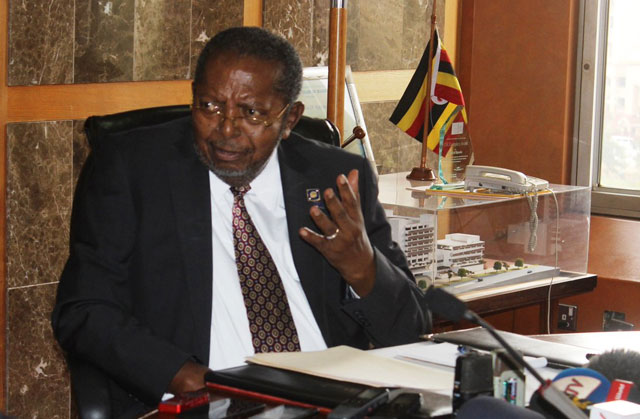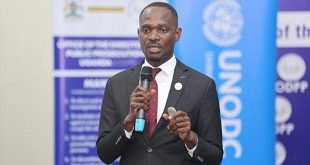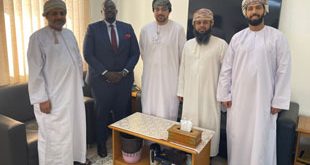
Longest-serving central bank boss feted at inaugural lecture
Kampala, Uganda | IAN KATUSIIME | The launch on Jan.11 of the Tumusiime Mutebile Centre of Excellence was the perfect moment to fete the long-serving governor of the central bank. At the helm since 2001, Mutebile is the longest serving governor the bank has had in its 50 years of existence and he cheerfully joined a chorus of speakers at the event held at Naguru Skyz Hotel in Kampala to celebrate, reminisce and reflect on that period.
The event also witnessed the Inaugural Tumusiime Mutebile Centre of Excellence Business Dialogue held under the theme ‘Three Decades of Economic Reforms in Uganda: Building a Base for Wealth and Job Creation’.
Prime Minister Ruhakana Rugunda, as chief guest, hailed Mutebile for stabilising the economy during its most difficult times.
“Mutebile is the bedrock of our current macroeconomic stability, a role he has played diligently in the last three decades,” he said.
As the event started, Prof. Nuha Mwesigwa, the executive director of the MUK Private Sector Forum, showered Mutebile with compliments and high sounding praise of the Governor’s professional and intellectual standing in the worldwide banking fraternity.
He asked, “How do we harness the person, character and potential of his network to answer questions of Uganda’s economy?”
He cited Mutebile’s frankness, professionalism and management style.
“The rare but envied qualities Mutebile has will permeate through the characteristics of the Centre of Excellence,” he said.
In his remarks, Mutebile also laid out his hope about Uganda’s economic challenges and his vision for the centre.
“It is a new hub for providing transformative and alternative solutions for private sector growth and employment creation in Uganda,” he said.
He was reflective on the path Uganda has taken since the reform process started years ago.
“As you may all be aware, Uganda was a vanguard in economic reforms in the 1990s,” he said. Then he turned to the key note speaker of the day, the former president of African Development Bank, Donald Kaberuka and added, “I want to appreciate Dr Donald Kaberuka here with whom I share the fact that those reforms though tough at the beginning created conditions for a performing economy.”
When he spoke, Kaberuka adopted the posture of someone who did not want to appear to be giving advice to any specific African country and was futuristic in his remarks. He described several complex challenges that economies on the African continent face, and said many of them require the government, business, academia, and the private sector to come together to confront them.
The former Minister of Finance in Rwanda listed some of these challenges as massive unplanned urbanisation, geopolitical tensions, population growth and climate change. He said African countries should have a sense of urgency.
“Make sure your policy is translated into practice and your intent is turned into implementation,” he said. Kaberuka also advised those in charge of planning for African economies against “overloading” their work plans to avoid creating a mismatch between ambitions and capacity. He added caveats for good public policy.
“It must be technically sound, politically feasible and administratively deliverable,” he said.
Kaberuka also weighed in on the current debate of state and private sector fusion in doing business. “Smart countries usually employ their private and state sector for economic management at both a macro and micro level.”
He cited a case of the Asian financial crisis in 1997 when a number of Asian countries took steps to limit the number of bankruptcies.
After praising Mutebile on the reform process he led in the early years of the NRM government, Kaberuka urged that the spirit of reforms needs to be maintained. “Economic reforms require discipline, hard work and persistence,” he stated.
It was on this basis that Kaberuka, now a Special Envoy of the African Union on Sustainable Financing for the Union, called upon the Tumusiime Mutebile Centre of Excellence to use its convening power to lead new thinking on challenges facing the economy.
“The only definition for such a center should be a programme that combines expertise and related resources in a competitive manner with an interdisciplinary approach.”
Kaberuka asked the centre to explore further on recurring issues like natural resources. “There is evidence of a weak link between economic transformation and natural resources; a centre like this should guide the way on such topics,” he urged.
The Tumusiime Mutebile Centre of Excellence will be based at Makerere University. Prof. Mwesigwa mentioned some of the objectives of the dialogue as bringing into focus the Centre’s strategy for private sector transformation through executive programmes, entrepreneurial training and capacity development for quality, productivity and for local companies to go global.
The organisers of the dialogue were Makerere University (MUK) Private Sector Forum and Bank of Uganda (BoU). It was attended by former Finance Minister Maria Kiwanuka, Patrick Mweheire Stanbic Bank MD, Richard Byarugaba NSSF MD, Jolly Kaguhangire Uganda Investment Authority ED, Capital Markets Authority CEO Keith Kalyegira among other top managers.
The launch of Tumusiime Mutebile Centre of Excellence, which some people have described as the central bank boss’s legacy project, comes at a time when the central bank is being scrutinised for its handling of recent challenges in the monetary sector; including the eventual sale of Crane Bank. But there is no doubt that, for Mutebile, it is well-deserved recognition.
 The Independent Uganda: You get the Truth we Pay the Price
The Independent Uganda: You get the Truth we Pay the Price


